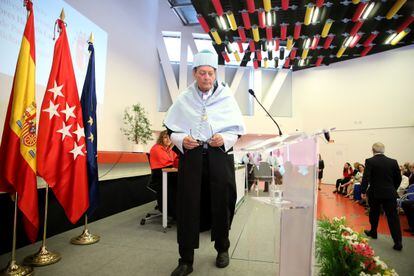With an elegant walk, somewhat stooped, and that deep gaze with bulging eyes, Paul Auster entered the multipurpose room on the Cantoblanco campus at eight minutes past 11 on Thursday morning —protocol commands and slows down— to receive the title
honorary doctorate
from
the Autonomous University of Madrid.
Considered to his discomfort and irritation as the most European of North Americans of his generation, Auster (Newark, 75 years old) deserves a place in the Olympus of the narrative of his country, which has traveled, wandered, kicked and opened the canal with the characters and themes from works such as
The Palace of the Moon
,
Leviathan
or
Mr Vertigo
.
“He represents the values of humanism as a critic and writer”, Professor Laura Arce, godmother of Auster at the event, has summed up to justify one more recognition for the New Yorker.
Author translated into more than 40 languages, his work of universal scope has earned him the Prince of Asturias Award for Letters in 2006 and the appointment as Knight of the Order of Arts and Letters of France in 1992, among others.
The invention of solitude
(1982) marks the beginning of a narrative career that will also go through the translation of great French authors (facet of youth with which he later showed himself tired) poetry and cinema (
Smoke
or
Lulu on the Bridge
) .
A total of 26 novels and nine essays with identity, the ultimate meaning of being American or destiny as major themes.
Chance is not one of his most relevant hallmarks (despite the title of the excellent and obscure
La Música del Azar
) but, as he has explained so many times, "necessity and contingency", aspects that are reflected in the monumental
4 ,3,2,1
(Seix Barral) his last novel to date, a narrative thrust capable of defeating any writer and which he completed shortly after with the hybrid
The Immortal Flame by Stephen Crane
(also Seix Barral), an exploration of creation as a vital engine.
Two books in which the author left an immortal stamp and proved, as he did again this Thursday, his state of form after more than 40 years of career.
Paul Auster just before beginning his speech. Samuel Sánchez
Worried about looking good in the photo, a smiling Auster has put on his clothes and patiently waited for his turn to speak.
After receiving the symbols that accompany the laureate cap (a ring, white gloves and the science book) and before the speech he joked about the act, about the honor of being there, about the finery of the occasion.
"Look at me, I never thought I'd wear something like this," he said with a laugh.
believe in wolves
The author of
The New York Trilogy
He had prepared a gift for the academic public that packed the room.
A text written at the beginning of the pandemic that linked his family tradition with Ukraine.
That's how he introduced it.
“In 2017, I was invited to Lviv to participate in the International Congress of the PEN Club.
I accepted the proposal for various reasons, including personal.
My grandfather was born in a city two hours south of Lviv and immigrated to the United States around the year 1900. This was my chance to visit that place.
Formerly known as Stanislau or Stanislav, it was renamed Ivano-Frankivsk in 1962 and has grown into a prosperous city of more than 200,000 inhabitants.
Two years ago, in the early days of the pandemic, I sat down to write the following article, which recounts the extraordinary day I spent in Ivano-Frankivsk back in 2017.
Richard L. Kagan (on the left) talks with Paul Auster, this Thursday. Samuel Sanchez (EL PAÍS)
As he read the speech in a deep, melodious voice, he paused for a moment at the noise of a protest taking place outside.
"We do the best we can, but we have a lot of competition out there," she joked.
“They are indefatigable, let's see if they take a break to eat”, she insisted a little later to the delight of the staff.
The text, something more than a chronicle of a day in a strange country, is a story within another story, a search for its roots, a small sample of the Austerian universe applied to reality.
It is titled
Stanislav's Wolves
and ends with a brief reflection on what he heard during those hours from the mouth of a poet.
Something in the story is wrong, the facts don't add up, they lean dangerously towards legend, but it doesn't matter: “What should we believe when we can't be sure if an alleged fact is true or not?
In the absence of information that can confirm or deny the story that the poet told me, I prefer to believe him.
Whether they were there or not, I choose to believe in wolves."
Then, insistent applause at the magnitude of the gift.
“You live alone.
Others are around us, but we live alone.
Sometimes we manage to peer into the other's mystery, penetrate it, but it is very rare.
It is love, mainly, that allows these encounters”, he told Gérard de Cortanze accurately and farsightedly in 1995 in an interview in New York included in
Dossier Paul Auster
(Anagrama).
This hot morning at the Cantoblanco campus, a few kilometers from Madrid, Auster has not been alone and all his readers and the few dozen people who have seen how he received the honors from the Autonomous University are in luck.

